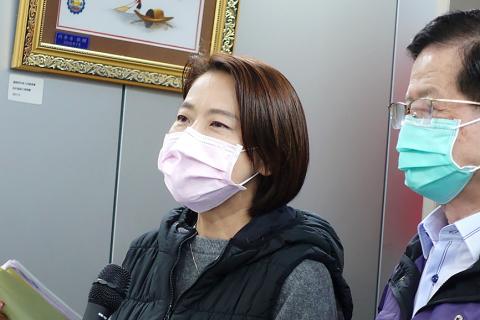Taipei officials have fined a person NT$1 million (US$33,228) for breaking quarantine, Taipei Deputy Mayor Vivian Huang (黃珊珊) said yesterday.
It was the first time the city has issued the maximum fine for contravening its efforts to contain the spread of COVID-19 in Taiwan.
The person, who was not identified, on Monday arrived from Xiamen, China, and according to Taiwan’s disease-prevention regulations, should have remained under home quarantine until March 23, the Taipei Department of Health said.

Photo: Shen Pei-yao, Taipei Times
The person was arranged to stay at a hotel, as they refused to provide their home address when passing through customs, the department said.
However, city officials and police could not find the person in their hotel room when they visited for a control check on Tuesday, it said.
The person was later found at Kaohsiung International Airport when they tried to purchase an airplane ticket out of Taiwan, the department said.
The Centers for Disease Control (CDC), and the health departments in Taipei and Kaohsiung coordinated to have the person escorted to a quarantine center in Kaohsiung, it said.
Over the past two weeks, the Taipei City Government has fined 70 people — 63 of whom were fined NT$10,000, four were fined NT$70,000, and three were fined NT$50,000, NT$60,000 and NT$1 million respectively.
In related news, a woman who arrived at Taiwan Taoyuan International Airport from the US via Hong Kong on Monday traveled to her home in a regular taxi in contravention of regulations.
People arriving from Hong Kong must not use public transportation and must quarantine themselves at home for 14 days, according to regulations.
The woman initially tried to get on a bus to Tainan, but was turned away by driver after the driver found out that she had arrived from Hong Kong, airport police said.
She had not arranged anyone to pick her up and did not have a vehicle to travel home, police said.
After learning that she must take a designated “disease prevention” taxi or face a fine of between NT$100,000 and NT$1 million, the woman said that she had no money and loitered at the airport for seven hours, during which she removed her mask, they said.
Airport police said they could not fine her, as the rules stipulating punishments for such offenses were to take effect the following day.
Her family offered to pay for the taxi when she arrived home, but the woman refused, police said.
Although a police detail was stationed to watch the woman, and taxi and bus drivers were instructed not to transport her, she managed to board the airport tram to Terminal 1 and took a taxi to Taoyuan’s Nankan District (南崁), where she boarded a bus to Tainan, airport police said.
The incident suggests that the current policies need improvement, they said.
The CDC said that people under home quarantine may take public transportation if they wear a mask, but cannot take public transportation from an airport upon returning from a country or area with an at least level 2 “alert” travel warning, according to Ministry of Transportation and Communications’ disease-prevention rules.

The manufacture of the remaining 28 M1A2T Abrams tanks Taiwan purchased from the US has recently been completed, and they are expected to be delivered within the next one to two months, a source said yesterday. The Ministry of National Defense is arranging cargo ships to transport the tanks to Taiwan as soon as possible, said the source, who is familiar with the matter. The estimated arrival time ranges from late this month to early next month, the source said. The 28 Abrams tanks make up the third and final batch of a total of 108 tanks, valued at about NT$40.5 billion

Two Taiwanese prosecutors were questioned by Chinese security personnel at their hotel during a trip to China’s Henan Province this month, the Mainland Affairs Council (MAC) said yesterday. The officers had personal information on the prosecutors, including “when they were assigned to their posts, their work locations and job titles,” MAC Deputy Minister and spokesman Liang Wen-chieh (梁文傑) said. On top of asking about their agencies and positions, the officers also questioned the prosecutors about the Cross-Strait Joint Crime-Fighting and Judicial Mutual Assistance Agreement, a pact that serves as the framework for Taiwan-China cooperation on combating crime and providing judicial assistance, Liang

A group from the Taiwanese Designers in Australia association yesterday represented Taiwan at the Midsumma Pride March in Melbourne. The march, held in the St. Kilda suburb, is the city’s largest LGBTQIA+ parade and the flagship event of the annual Midsumma Festival. It attracted more than 45,000 spectators who supported the 400 groups and 10,000 marchers that participated this year, the association said. Taiwanese Designers said they organized a team to march for Taiwan this year, joining politicians, government agencies, professionals and community organizations in showing support for LGBTQIA+ people and diverse communities. As the first country in Asia to legalize same-sex

MOTIVES QUESTIONED The PLA considers Xi’s policies toward Taiwan to be driven by personal considerations rather than military assessment, the Epoch Times reports Chinese President Xi Jinping’s (習近平) latest purge of the Chinese People’s Liberation Army (PLA) leadership might have been prompted by the military’s opposition to plans of invading Taiwan, the Epoch Times said. The Chinese military opposes waging war against Taiwan by a large consensus, putting it at odds with Xi’s vision, the Falun Gong-affiliated daily said in a report on Thursday, citing anonymous sources with insight into the PLA’s inner workings. The opposition is not the opinion of a few generals, but a widely shared view among the PLA cadre, the Epoch Times cited them as saying. “Chinese forces know full well that